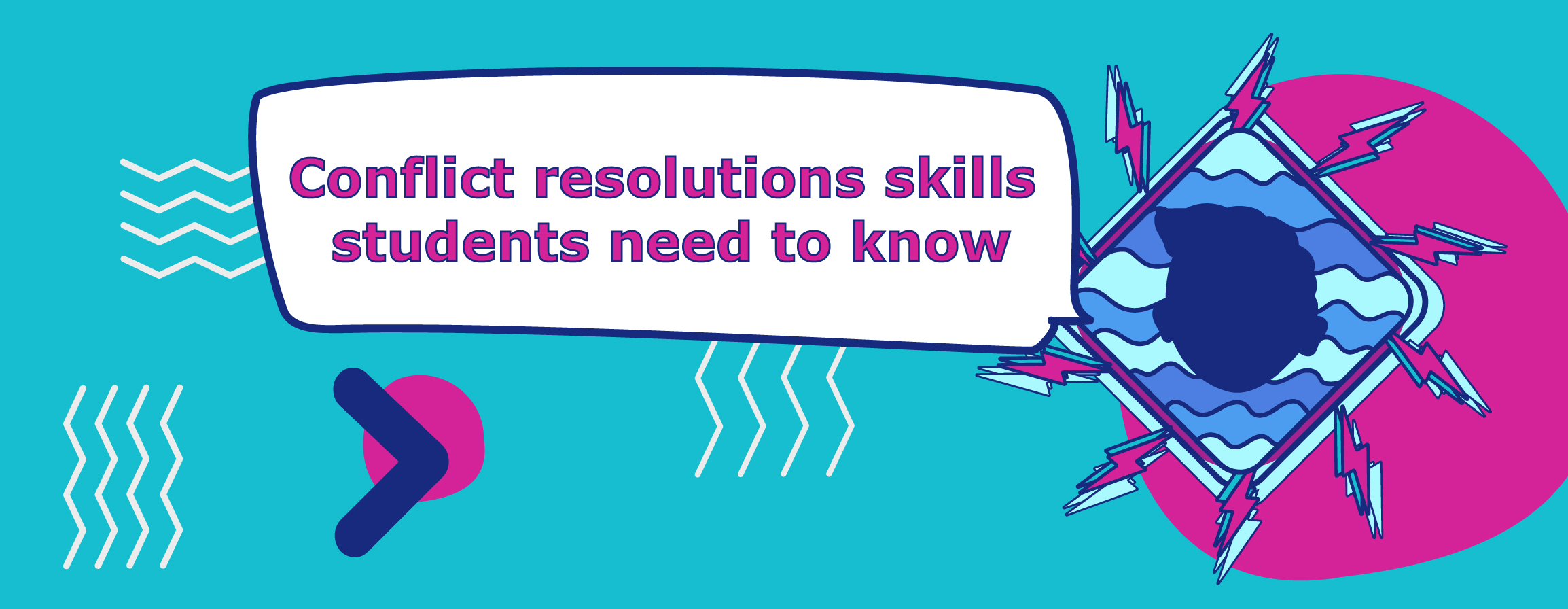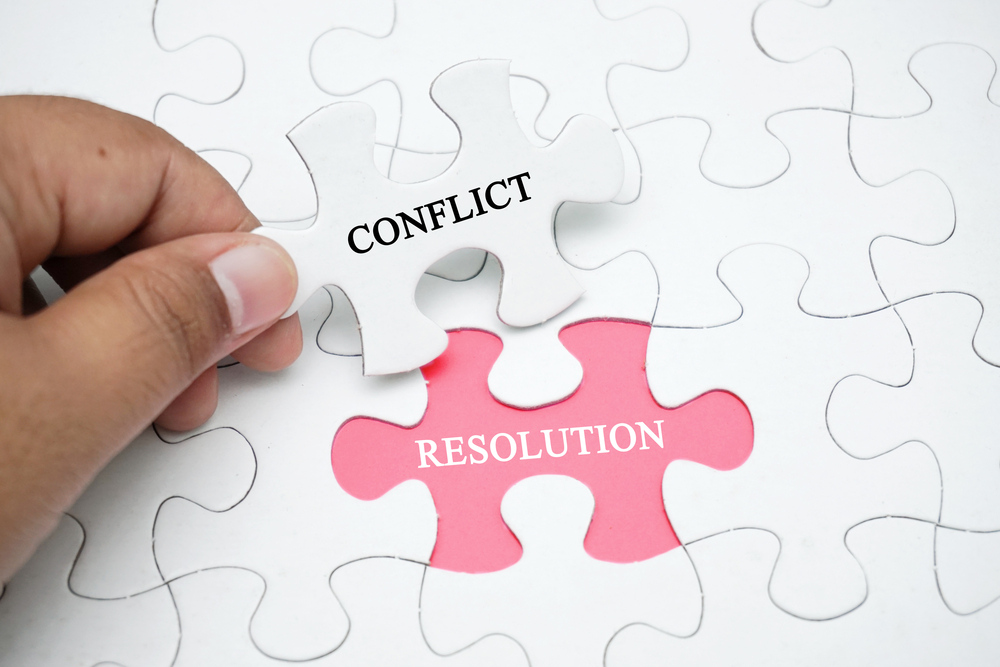Conflict Resolutions Skills Students Need to Know
Tips and Advice
03 September, 2021
|
4 mins read
By Hadeel Hossam
Share

Conflict Resolutions Skills Students Need to Know
Tips and Advice
03 September, 2021
|
4 mins read

By Hadeel Hossam
Share
Conflict is inevitable in everyday life because people will never be on the same page on everything. Therefore, we need to develop a certain set of skills to be able to handle conflict correctly and efficiently.
At university, you are bound to be in settings where conflict arises during group work or lectures, and you must learn how to manage it.
Why Should University Students Have Conflict Resolution Skills?
You might think that this is an unnecessary skill for someone who is still just a student. However, it’s one of the most important ones you’ll need. University life is full of social interactions, whether in an academic context or not. Things like group projects and presentations, study groups, and social gatherings are all settings where conflict is prone to arise at any time.
Having the necessary skills to alleviate such conflict between peers is extremely beneficial in strengthening relationships. It will also reduce disruption to the activity at hand, helping you be more productive as a group. Tension in any group setting stops things from getting done and ruins the enjoyment of any activity. Moreover, these skills also come in handy in every student’s personal life while dealing with conflict with family and friends in a healthy manner.
Skills Needed To Manage Conflict
1. Active Listening
This is an important life skill in general, but it is specifically relevant to conflict resolution to fully know the situation from both parties. You need to be attentive to what is being said in conflict situations without cutting off or interfering in the conversation. Keeping open ears is the only way to keep an open mind and fully take in what is being said and understand it.
2. Communication
Active listening is one thing, and communication during a conflict is something entirely different. While listening technically falls under communication skills, it would be pointless to communicate your response to what you’ve heard without having the necessary skills. Each person has a way of communicating that depends on their background and experience. That’s why it’s important to ask for clarification when you don’t understand something and clarify yourself when needed. Check your university’s classes to see if they have communication skills lectures or workshops that you can attend to enhance this skill.
3. Emotional Intelligence
In cases of conflict, emotion always plays a part and can cause further struggle to resolve things. This is where the skill of emotional intelligence comes into play, to understand your own feelings and others and take them into consideration. Emotional intelligence helps you navigate your way through a conflict without having it unnecessarily escalate. Understanding your own emotions is also important to be able to communicate them effectively.
4. Impartiality
One of the most important skills when managing a conflict between two parties is impartiality. This is because conflicts can easily develop and become personal. People involved in the conflict can use it to bring up past held grudges, and things get messier. When managing a conflict like this, you mustn’t take sides or express anything that may indicate that you agree or lean towards what one person is saying. Try to instead re-navigate the discussion to the problem at hand and suggest possible solutions.
5. Patience
Managing disputes is no easy thing, so you should be prepared for the possibility of the situation not being resolved right away. This might be a nuisance in a group project or any other academic need since it would waste time. However, you need to be patient with these things and not rush them because they might worsen. Rushing a solution for a conflict will only make the parties involved feel excluded in making their own decision and feelings known and heard.

Strategies to Resolve Conflict
1. Immediate Stress Relief
As soon as a conflict arises, the best way to start handling it is with quick stress relief to prevent the situation from escalating. Stress relief mainly refers to staying centred and calm in order not to get overwhelmed and respond in an unhealthy way. So find something that soothes you and practice it in situations of conflict where you need to calm yourself instantly.
2. Acknowledge Emotions
Once you’ve calmed down, you need to take a minute to recognise your emotions to control them. Don’t try to ignore strong feelings like anger, sadness or fear because it will only limit your ability to respond to the situation at hand. It’s important you also take a minute to acknowledge the other party’s emotions and what is troubling them to make it easier to reach common ground.
3. Don’t Get Defensive
In conflict, many people’s first instinct is to jump into defence and attack the other person, whether passively or directly. However, this only makes the situation worse and escalates it, so try not to take anything said against a point you made personal. Instead of answering objections with defensive ‘yes’ and ‘no’ statements, try the strategy of “yes, and”. Start your statement with things like “Yes, I understand, and I believe..’ or “I hear you, and what I’m saying is..’. It might seem simple, but it can go a long way in smoothing over the situation.
4. Try ‘I’ Statements
In a conflict, it’s easy to start pointing fingers and blaming each other, which is a one-way ticket to a full-blown argument. To avoid this, make sure you start your sentences with ‘I’ statements such as “I feel, I believe, etc.”. It’s much better to say, “I feel like I didn’t have a chance to explain,” than saying, “you’re not listening to me”.
5. Use Humour
Using humour during a conflict can work like magic in ending the whole thing if done right. However, it might not also be the appropriate strategy to use and can make things tense. If a conflict is personal, humour would be the wrong move since offending the other party would be a chance. It’s perfect, however, if the conflict is superficial to alleviate tension and help parties involved loosen up and discuss the issue more light-heartedly.
Handling conflict is a skill in itself that gets sharpened the more you have interactions and experiences. You get to know yourself and your reactions and better control them and how to handle other people in a way that does not make things worse. The main things to remember during a conflict, whether you’re part of it or not, are listening well before speaking, picking your battles, and being willing to forgive and forget to spend your college years in peace.
Tips and Advice
By Hadeel Hossam
Share
Tips and Advice
By Hadeel Hossam
Share


